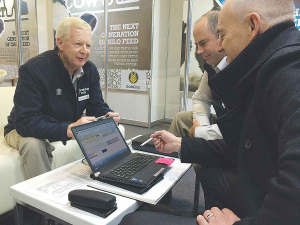M.I.A.
OPINION: The previous government spent too much during the Covid-19 pandemic, despite warnings from officials, according to a briefing released by the Treasury.
 RMPP Action Group facilitator John Stantiall says farmers adapted to digital meetings better than he expected. Photo: file.
RMPP Action Group facilitator John Stantiall says farmers adapted to digital meetings better than he expected. Photo: file.
Red Meat Profit Partnership (RMPP) Action Group facilitator John Stantiall was unsure, at the start of the Covid-19 lockdown, how meetings could work.
“But then I discovered Zoom and farmers adapted to that far better than I expected,” he says.
Stantiall, who is an agricultural consultant with Perrin Ag, facilitates eight Action Groups. His groups broke their usual full-day, on-farm meetings down into three Zoom meetings – including ‘virtual farm visits’.
He was also a regular participant in the weekly online support meetings RMPP invited all their facilitators to join throughout alert levels 3 and 4. This enabled them to share experiences and advice around the different online tools they were using.
Since July 2019, RMPP had already been running monthly online meetings, which all facilitators could participate in. However, during lockdown these were held weekly to provide additional support and advice about facilitating remotely and using online tools, and to practice using them. The number of participants increased significantly.
“We are in contact with all our facilitators regularly,” says Denise Bewsell, extension specialist for the RMPP Action Network.
“We get to hear what is happening with each of the groups but thought it would be great for facilitators to be able to share experiences and practical tips directly. We always say that ‘farmers like to talk to farmers’ – and facilitators like to talk to facilitators,” she adds.
“Increasing that to weekly meetings worked really well. There were really varied responses from facilitators at the start of lockdown in terms of how they felt online meetings would work. Some were confident it would work, while others felt it would be hard and were concerned about broadband or that farmers would not have the right equipment.
“It was really good for them to talk about their experiences and for those who were concerned to talk with other facilitators who were already trying it. We very quickly had people asking each other a lot of questions, such as ‘how is shared Google Docs working for you’ or ‘how are you finding using Chatbox?’ Shared experience really supported people in getting started with online meetings.”
The facilitator meetings will also include sessions with subject matter experts including Australians Dr Ruth Nettle, an authority on extension in rural change, and extension specialist John James. Another upcoming talk is planned with sport development consultant Hugh Galvan of Sport New Zealand.
Stantiall says that he found the RMPP weekly meetings incredibly supportive and kicking off online Action Group meetings with a relaxed approach worked well.
“In the early ones, in particular, farmers were still facing a lot of issues alongside the lockdown,” he says. “It was still very dry, and many needed to sell stock. They really appreciated the meetings continuing and being able to just talk to other farmers.
“Without Zoom it would have been difficult to have any meetings at all and that could also potentially have been a threat to my work.”
Stantiall also sees greater opportunities for engaging with farmers remotely in the future.
“This has opened up a whole new range of opportunities for expert speakers,” he says.
“Coming out of lockdown, we have had Action Group meetings back on farm and we have enough to focus on in the short to medium term, but in the longer term planning, options will include getting expert speakers via Zoom for a lot less cost, when you don’t have to take travel and accommodation into account.”
The Meat Industry Association of New Zealand (MIA) today announced that Chief Executive Officer Sirma Karapeeva has resigned from the role.
The winners of the 2026 Hawke’s Bay/Wairarapa Dairy Industry Awards were announced at the annual awards dinner held at Copthorne Solway Park in Masterton on Thursday evening.
Environment Southland is welcoming this week’s decision by the Environmental Protection Authority (EPA) to approve the release of Blaptea elguetai, a leaf‑feeding beetle that will help control the highly invasive Chilean flame creeper.
This March, the potato industry is proudly celebrating International Women’s Day on 8 March alongside the International Year of the Woman Farmer, recognising the vital role women play across every part of the sector — from paddocks and packhouses to research, leadership, and innovation.
Fruit trader Seeka posted a record profit and returns to shareholders in 2025.
Recent weather events in the Bay of Plenty, Gisborne/Tairawhiti, and Canterbury have been declared a medium-scale adverse event.

OPINION: A mate of yours truly reckons rural Manawatu families are the latest to suffer under what he calls the…
OPINION: If old Winston Peters thinks building trade relations with new nations, such as India, isn't a necessary investment in…